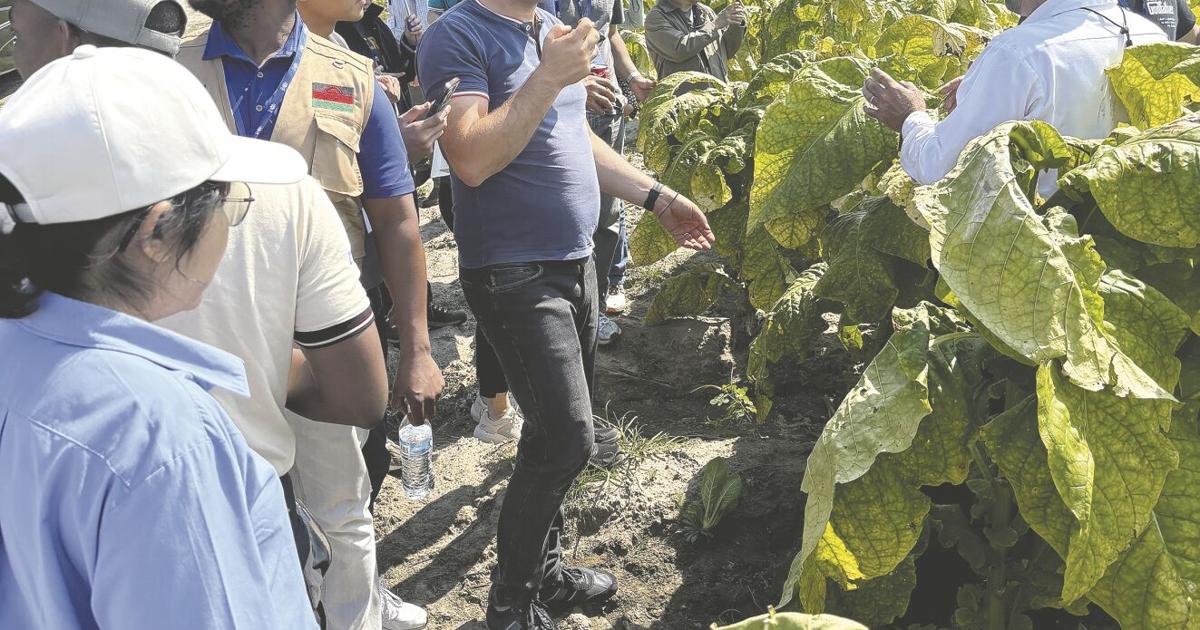
Exploring Global Tobacco Practices: Harnett County Hosts International Training Mission
In an increasingly interconnected world, the importance of sharing knowledge across borders cannot be overstated. This week, Harnett County, North Carolina, showcased this spirit of collaboration by hosting the 12th U.S. Leaf Training and Study Mission, a significant event that drew participation from international tobacco specialists from various corners of the globe. The initiative, facilitated by Harnett County Extension in partnership with Tobacco Associates Inc., aimed at enhancing the understanding and practices associated with tobacco cultivation—an industry that remains critical for many economies worldwide.
A Gathering of International Experts
The event welcomed a diverse group of 23 participants hailing from 11 distinct countries, including Brazil, Indonesia, Malawi, Moldova, Singapore, Thailand, Turkey, the United Arab Emirates, Uruguay, Vietnam, and Zambia. These representatives brought a wealth of knowledge, cultural perspectives, and unique experiences to the table, fostering a rich exchange of ideas.
Tobacco farming is not just an agricultural practice; it is a livelihood for millions and plays a vital role in the economies of many nations. Although the negative health impacts of tobacco have led to increased regulation and a decline in smoking rates in many developed countries, many developing nations still rely heavily on tobacco for economic stability. Thus, this training mission held special relevance, as it sought to equip farmers and industry professionals with sustainable practices to improve yield and quality while balancing agricultural and health considerations.
Farm Tours in Harnett County
The participants had the opportunity to tour three local tobacco farms during their mission. This hands-on experience allowed them to observe modern farming techniques, soil management practices, and innovative processing strategies implemented in the region.
Harnett County, known for its fertile land and favorable climate for tobacco cultivation, serves as an ideal backdrop for such an event. As these international delegates mingled with local farmers, the blending of tradition and modernity became apparent. Many U.S. farmers have adopted advanced agricultural technologies, which can offer valuable lessons to farmers from regions that may still rely on more traditional farming methods.
For instance, integrating precision farming techniques and utilizing data analytics to anticipate crop health are just some of the advances that can lead to higher productivity. Workshops held during this training mission focused on educating participants about these innovations while paying tribute to the agricultural traditions that underpin the tobacco industry.
Sustainable Practices and Global Challenges
One of the primary focuses of the training mission was sustainability—an essential topic as global challenges such as climate change and resource scarcity become increasingly urgent. The rise in temperatures and changing weather patterns can significantly impact crop yields. As a result, participants engaged in discussions about adaptive measures, such as selecting drought-resistant varieties and optimizing irrigation techniques to conserve water.
Additionally, the event highlighted the need to consider the socio-economic implications of tobacco farming. While tobacco can be a lucrative crop, its production can also come with environmental and health-related challenges. Thus, striking the right balance between profitability and social responsibility is crucial for future viability.
Cultural Exchange and Networking Opportunities
Beyond the farm tours and technical workshops, the mission also served as an invaluable networking platform. Participants shared their personal insights and experiences, discussing the unique challenges they face in their respective countries. For instance, delegates from Vietnam and Malawi articulated the need for more robust tobacco regulations aimed at protecting public health without crippling the livelihoods of farmers.
The cultural exchange aspect of the training mission cannot be overlooked. Participants engaged in informal discussions over meals, sharing traditional dishes and stories from their home countries. This kind of connection fosters goodwill and sets the stage for future collaborations that extend beyond tobacco farming.
Looking Ahead
As the participants depart Harnett County armed with new knowledge and connections, the implications of this mission extend beyond immediate practical applications. The essential dialogue that occurred paves the way for ongoing partnerships and exchanges that prioritize sustainable practices and ethical responsibility in the global tobacco industry.
In a world where agriculture faces constant changes and challenges, initiatives like this mission are critical. They not only promote knowledge transfer but also encourage a global community to work collectively toward solutions that benefit all stakeholders involved in tobacco farming.
In conclusion, as tobacco remains an economic staple in many parts of the world, it is prudent to engage in these discussions and training initiatives to ensure future generations can sustain their livelihoods while safeguarding public health.
Tags: #BusinessNews #EconomyNews #TobaccoIndustry #HarnettCounty #GlobalTrade

